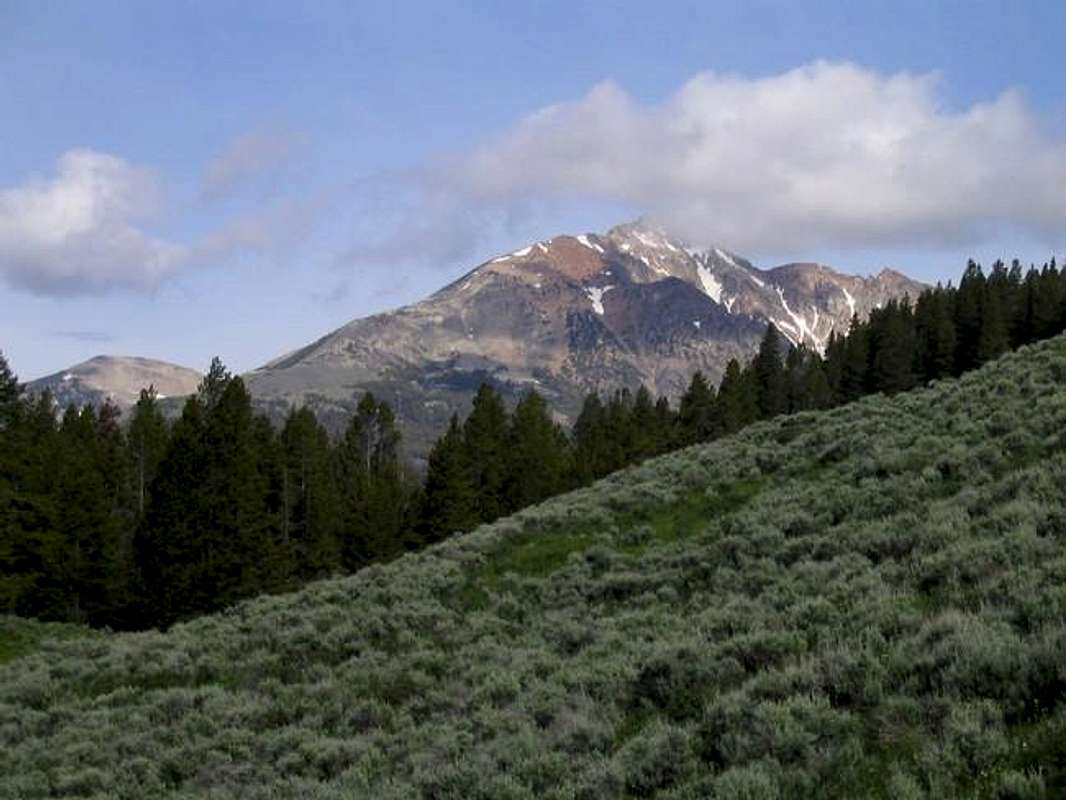-
 76009 Hits
76009 Hits
-
 93.45% Score
93.45% Score
-
 43 Votes
43 Votes
|
|
Mountain/Rock |
|---|---|
|
|
45.00530°N / 110.837°W |
|
|
10969 ft / 3343 m |
|
|

Electric Peak
(Photo by SP member Alcas24)
Overview
Electric Peak is the most prominent peak in the northwest corner of Yellowstone National Park. With its dominating appearance over the surrounding area, the peak is often mistakenly believed to be the highest point in Yellowstone, but it is actually the 8th highest summit in the park. With an elevation of 10,969 feet it is the highest point in the Gallatin Range. Although much of the mountain and its common approach route lie in the state of Wyoming, the actual summit lies just over the border in the state of Montana.
The first ascent of Electric Peak was made in 1872 by Henry Gannett during the Hayden Survey. Wyoming's highest point Gannett Peak was ultimately named for Gannett, and the survey results were instrumental in the subsequent establishment of Yellowstone National Park later that same year. The first ascenders of the peak were nearly killed by lightning when they reached the summit, and experienced electrical discharges on their hands and in their hair, hence the name Electric Peak.
While very strong hikers can climb Electric Peak as a long day hike, the majority of hikers will want to make the climb as part of a 2 or 3 day backpacking trip, with a camp in the vicinity of the Electric Peak spur tail.
USGS Quads:
- Electric Peak, Montana-Wyoming (1:24k)
- Quadrant Mountain, Wyoming-Montana (1:24k)
- Mammoth, Wyoming-Montana (1:24k)
Getting There
Yellowstone National Park occupies the northwest corner of Wyoming, as well as small portions of southern Montana and eastern Idaho. There are five major roads entering the park: - West Entrance - Highway 20 through West Yellowstone, MT
- North Entrance - Highway 89 through Gardiner, MT
- Northeast Entrance - Highway 212 through Cooke City, MT
- East Entrance - Highway 20 through Cody, WY
- South Entrance - Highway 89 through Grand Teton NP
- The North entrance at Gardiner Montana is the only entrance which remains open during the winter. Refer to the Operating Hours & Seasons page for complete details on road opening and closing dates in the park.
Additional information can be found on the Yellowstone Plan Your Visit web page.
Electric Peak and the approach trailhead are located near Mammoth Hot Springs, in the northwest region of the park. The peak is most commonly climbed via the Sportsman Lake Trail, which begins from the Glen Creek Trailhead. Refer to the Sportsman Lake Trail route for complete details on ascending the peak.
Red Tape
Yellowstone Entry Fees
Entering Yellowstone National Park requires purchase of a $25 7-day pass, available at any of the five entry stations entering the park. This pass allows entry into both Yellowstone and Grand Teton National Park to the south. Alternatively, an annual America the Beautiful - National Parks and Federal Recreational Lands Pass may be purchased for $80. This pass provides access to, and use of, Federal recreation sites that charge an entrance or amenity Fee, for a period of one year.
Backcountry Permits
A backcountry camping permit is required for all overnight trips into the Yellowstone backcountry. Backcountry camping permits may be reserved in advance, and require a $15 fee. Backcountry permits may also be obtained on a walk-in basis, (subject to availability) no more than 48 hours prior to the hike - there is no charge for walk-in permits.
Permits may be obtained from most ranger stations in the park. When picking up backcountry permits you will be required to view a short video on regulations and safe travel in the Yellowstone backcountry. The Yellowstone Backcountry Camping & Hiking page contains complete details and regulations on backcountry trips in the park.
Camping and Lodging
There are numerous options for camping within Yellowstone National Park. Regulations and available facilities varies among the campgrounds. Visit the Campgrounds in Yellowstone page for complete details.
There are also a number of lodging facilities within the park, ranging from rustic cabins to luxurious lodges and inns. Lodging in Yellowstone is administered by Xanterra Parks & Resorts, the primary concessioner in Yellowstone. Refer to their website for complete details on locations, reservations, etc.Bear Precautions
Both grizzly and black bears are found in the park. Several of the most important precautions for safe travel in bear country include the following: - Do not hike alone; travel in groups and stay together
- Stay on the trail
- Announce your presence by making loud noise as you hike
- Do not hike at night
- Never store food in a tent; suspend food from a tree or bear pole
- Never approach wildlife; keep a safe distance
Visit Yellowstone's Minimizing the Dangers of a Bear Encounter web page for additional information on hiking in bear country.When To Climb
The most common time to climb Electric Peak is from late May or early June through October, although this may vary considerably depending on snow conditions. For a completely snow-free hike plan on waiting until at least early July.
A winter attempt of Electric Peak is certainly possible, but would involve a very long multi-day approach by skis or snowshoes.
Weather and Climate
Yellowstone's weather is best characterized by its unpredictability. Always be prepared with warm clothing and rain gear, even on warm and sunny summer days.
Weather related links: - Current weather conditions and forecast .
- Yellowstone climate information.
Electric Peak Web Cam
Visibility of the peak will vary due to weather conditions and daylight.
Courtesy of http://www.coolworks.com














